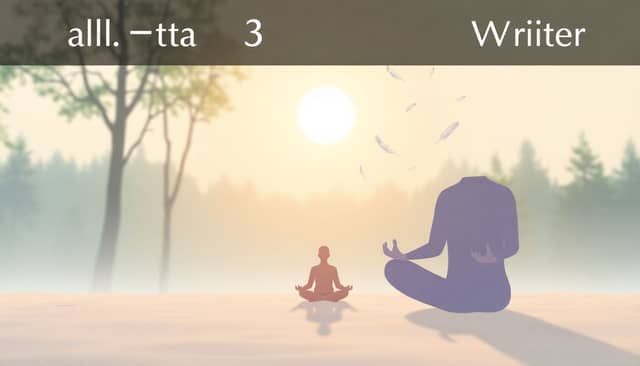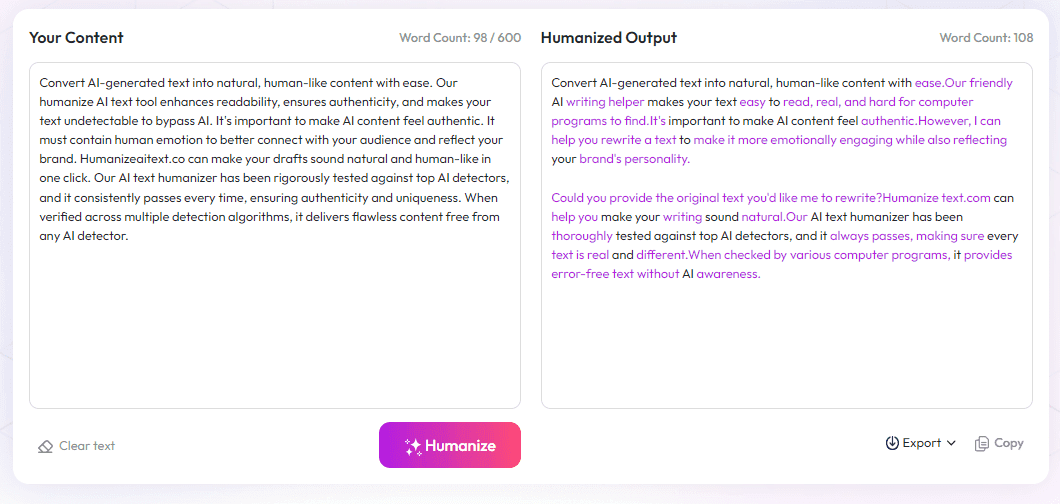Table of Contents
I know how easy it is to get lost in a sea of thoughts while trying to write. Sometimes, your mind just won’t cooperate, and the words won’t flow smoothly. Luckily, adding a bit of meditation to your routine can help calm that chaos and make your writing time more focused and enjoyable.
Stick with me, and you'll discover simple meditation tricks to start your day, stay present during writing sessions, and turn mindfulness into a natural part of your daily routine. Along the way, I’ll share stories from writers who swear by these routines—so you can see how it might work for you.
Ready to try one quick meditation today? Let’s get started—your next great story might just be a breath away.
Key Takeaways
– Starting your day with a few minutes of focused breathing or visualization can clear mental clutter, boost creativity, and set a calm tone for writing. Regular short meditation sessions help reduce stress, improve focus, and make writing more enjoyable. Trying quick exercises during breaks or before editing keeps you grounded and prevents your mind from wandering. Experimenting with different techniques and establishing a routine can make meditation a sustainable part of your writing process, helping you stay consistent and inspired. Even brief practices can instantly improve your writing flow and mental clarity.

Starting your day with meditation can be a game-changer for writers. Just a few minutes of focused breathing or visualization in the morning helps clear mental clutter, boost creativity, and set a calm tone for the day ahead. In fact, as of 2025, over 275 million people worldwide practice meditation, finding it effective for reducing stress and enhancing focus, especially among those who write regularly.
One simple yet powerful technique is focused breathing. Sit comfortably, close your eyes, and take slow, deep breaths—inhale through your nose for four counts, hold for four, then exhale slowly for four. Doing this for just 5 minutes can help calm your mind and prepare you for a productive writing session.
Visualization is another easy meditation exercise tailored for writers. Picture your story unfolding vividly or envision successfully completing your project. This mental imagery not only encourages motivation but also clears distractions, making it easier to dive into your work with clarity.
Integrating brief mindfulness pauses during your writing can also improve focus. Before starting or during breaks, pause to observe your surroundings, notice your breath, or perform a quick body scan—from head to toe. This keeps you grounded and prevents the mind from wandering into tangents or stress.
Research shows that long-term meditators report up to a 60% reduction in anxiety after several months of practice, which can be especially helpful when facing writer’s block or deadlines. Starting with just a few minutes each morning or incorporating quick exercises during writing sessions makes meditation manageable and sustainable.
For more structured guidance, consider trying a guided meditation designed for writers, combining mindful breathing and visualization specifically aimed at unlocking creativity. You can access various resources online that offer 5- to 10-minute sessions, often tailored to fit into even the busiest schedules. For example, some apps feature meditation sequences to help release creative blocks or foster a focused mindset.
To make meditation a consistent part of your writing life, establish a routine—perhaps morning meditation, a quick session during breaks, or even short mindful pauses before editing. This repetition helps reinforce the habit, supporting your mental clarity and emotional resilience as a writer.
Incorporating these simple exercises isn't just a trend; it’s backed by data showing that meditation improves focus, reduces stress, and enhances overall well-being, all of which support consistent, enjoyable writing. Want to try some practical exercises today? A good start is a quick breathing routine or a brief visualization session—you might find your writing flow improves instantly.

Find What Works: Try Different Meditation Methods
Not every meditation style clicks with everyone, so don’t be afraid to experiment until you find what feels right.
For example, some writers swear by body scan meditations, while others prefer mantra repetition or walking meditation.
Try a variety of techniques—like guided meditations, sound baths, or even movement-based practices like yoga—to see which boosts your focus best.
Checking out apps such as (https://www.headspace.com/) or (https://insighttimer.com/) can give you a good starting point for exploring different styles.
Remember, consistency matters more than the technique itself, so pick what you'll stick with long-term.
Get Support from Other Writers or Mindfulness Groups
Being part of a writing or meditation community can keep you motivated and accountable.
Join local or online groups where members share their meditation routines and writing progress.
Platforms like (https://www.meetup.com/) or Facebook groups dedicated to writers often have groups focused on mindfulness practices.
Participating in group meditations can introduce you to new techniques and help you stay committed.
Plus, connecting with others who understand the writer’s mind can lift your spirits and spark motivation when writer’s block hits hard.
Hear Stories from Writers Who Use Meditation
Many successful writers credit meditation as a key part of their daily routine.
Authors like Elizabeth Gilbert and Neil Gaiman have spoken openly about how mindfulness helps them stay focused and manage stress.
Listening to these stories can inspire you to give meditation a real shot.
Some writers even share how brief practices—like a five-minute breathing exercise—have helped them push through tough writing phases.
Knowing that others have benefited from meditation can motivate you to incorporate it into your own routine.
Take Action: Try One Meditation Exercise Today
The hardest part is often just starting, so pick one practice to do today.
For example, set a timer for five minutes and focus solely on your breath, inhaling for four counts and exhaling for four.
Or do a quick visualization: imagine your story coming to life vividly, or picture yourself finishing that daunting manuscript.
Keep it simple—don’t overthink it.
By taking that first step today, you’ll start building a habit that can make your writing sessions calmer and more productive.
FAQs
Beginning your day with meditation can help improve focus, reduce stress, and set a calm tone, making it easier to start writing with clarity and purpose throughout your session.
Try short breathing exercises or body scans between writing segments to reset your mind, help maintain focus, and prevent fatigue during long writing periods.
Focus on paying close attention to your words, sensations, and feelings while writing, avoiding distractions, and immersing yourself fully in the writing process.
Create a set time each morning or evening for meditation, then link it to your writing schedule as a regular part of your habit to maintain consistency and focus.



